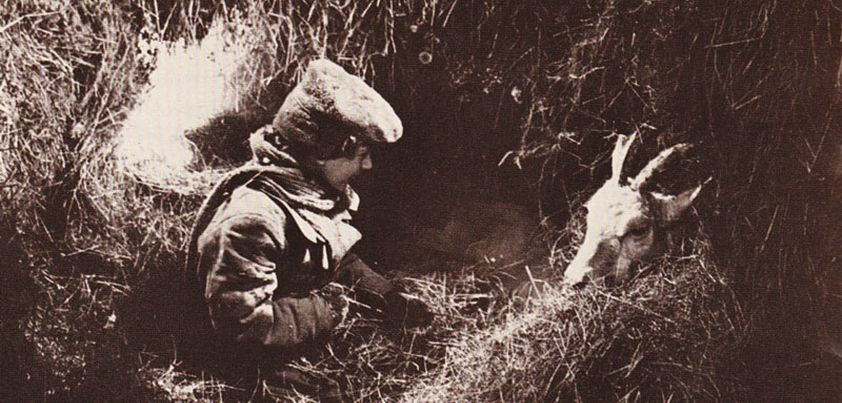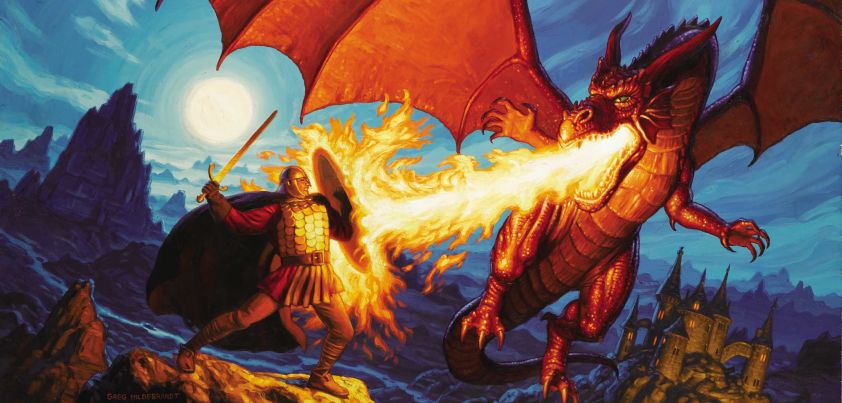 This story from Joan Aiken takes the form of a “three wishes” fairy-tale. The protagonist does something very unusual for someone given three wishes. He decides not to make the third wish. When asked why, he says: I’ve learned that even if your wishes are granted they don’t always better you. Themes: 1) change (it is wrong to force change on someone who is happy as they are); 2) family (for many people, family ties are just as important as a happy marriage); and 3) sacrifice (true love means being prepared to let someone go if it makes them happier). More…
This story from Joan Aiken takes the form of a “three wishes” fairy-tale. The protagonist does something very unusual for someone given three wishes. He decides not to make the third wish. When asked why, he says: I’ve learned that even if your wishes are granted they don’t always better you. Themes: 1) change (it is wrong to force change on someone who is happy as they are); 2) family (for many people, family ties are just as important as a happy marriage); and 3) sacrifice (true love means being prepared to let someone go if it makes them happier). More…
Category Archives: Grade 5-6 Stories
Christmas Every Day
 This children’s story by W. D. Howells is actually a ‘story within a story’. A demanding daughter insists that her busy father tell her a Christmas story. Perhaps with his daughter in mind, he makes up a tale about a little girl who makes a selfish Christmas wish. She wants it to be Christmas every day so she can get presents and eat Christmas treats all year long. The wish comes true but in so doing causes problems for almost everyone in the world. Although told in an amusing way, you could call this a Christmas horror fairy-tale. More…
This children’s story by W. D. Howells is actually a ‘story within a story’. A demanding daughter insists that her busy father tell her a Christmas story. Perhaps with his daughter in mind, he makes up a tale about a little girl who makes a selfish Christmas wish. She wants it to be Christmas every day so she can get presents and eat Christmas treats all year long. The wish comes true but in so doing causes problems for almost everyone in the world. Although told in an amusing way, you could call this a Christmas horror fairy-tale. More…
Little Red Riding Hood
 This time last year we featured Charles Perrault’s famous interpretation of an ancient folktale, Cinderella. Today we have another well-known Perrault story, Little Red Riding Hood. The version of the story most commonly told today is from a Brothers Grimm adaption known as Little Red Cap, published over 100 years after Perrault. In both versions, Red is punished for talking to strangers (the wolf) by being “eaten”. The Brothers extended the story to make it more appealing to children. In addition to Red and her grandmother miraculously surviving in the wolf’s stomach, they later meet and kill a second wolf. More…
This time last year we featured Charles Perrault’s famous interpretation of an ancient folktale, Cinderella. Today we have another well-known Perrault story, Little Red Riding Hood. The version of the story most commonly told today is from a Brothers Grimm adaption known as Little Red Cap, published over 100 years after Perrault. In both versions, Red is punished for talking to strangers (the wolf) by being “eaten”. The Brothers extended the story to make it more appealing to children. In addition to Red and her grandmother miraculously surviving in the wolf’s stomach, they later meet and kill a second wolf. More…
Sometimes a Dream Needs a Push
 There are two “dreams” in this inspirational story by W. D. Myers. The first is a father’s dream that his son follow in his footsteps and become a competitive basketball player; the second is the boy’s dream to be able to overcome his disability and return to the game. The “pushes” come when the boy is invited to join a wheelchair team, and the father overcomes his feelings of guilt and decides to help the team. Themes: guilt, courage, maintaining a positive attitude, family, father-son bonding, team spirit, how trying and doing one’s best is more important than winning. More…
There are two “dreams” in this inspirational story by W. D. Myers. The first is a father’s dream that his son follow in his footsteps and become a competitive basketball player; the second is the boy’s dream to be able to overcome his disability and return to the game. The “pushes” come when the boy is invited to join a wheelchair team, and the father overcomes his feelings of guilt and decides to help the team. Themes: guilt, courage, maintaining a positive attitude, family, father-son bonding, team spirit, how trying and doing one’s best is more important than winning. More…
Fish Cheeks
 The thesis for this narrative essay by Amy Tan is expressed in the form of a prayer: For Christmas I prayed for this blond-haired boy, Robert, and a slim new American nose. The protagonist, a fourteen–year-old girl, is uncomfortable with her Chinese looks and what others might think of her family’s Chinese ways. She is especially concerned because her would-be boyfriend Robert and his church minister father have been invited for Christmas dinner. After watching on in embarrassment as they sit through the meal of traditional Chinese delicacies, she receives some wise life advice from her mother. More…
The thesis for this narrative essay by Amy Tan is expressed in the form of a prayer: For Christmas I prayed for this blond-haired boy, Robert, and a slim new American nose. The protagonist, a fourteen–year-old girl, is uncomfortable with her Chinese looks and what others might think of her family’s Chinese ways. She is especially concerned because her would-be boyfriend Robert and his church minister father have been invited for Christmas dinner. After watching on in embarrassment as they sit through the meal of traditional Chinese delicacies, she receives some wise life advice from her mother. More…
Rikki-Tikki-Tavi
 The major themes of this famous children’s story from Rudyard Kipling’s Second Jungle Book are duty, loyalty and courage. When viewed from a Western perspective, the story’s motif is the triumph of good over evil. However, as the cobra is a revered Hindu religious symbol, the plot can also be interpreted as an allegory of colonial conquest: the victory of “benevolent” British imperialists (Teddy and his family) and the Indians who support them (Rikki-tikki) over those resisting domination and change (Nag and Nagaina). Other themes: family, the balance of nature, progress and peace under British colonialism.
The major themes of this famous children’s story from Rudyard Kipling’s Second Jungle Book are duty, loyalty and courage. When viewed from a Western perspective, the story’s motif is the triumph of good over evil. However, as the cobra is a revered Hindu religious symbol, the plot can also be interpreted as an allegory of colonial conquest: the victory of “benevolent” British imperialists (Teddy and his family) and the Indians who support them (Rikki-tikki) over those resisting domination and change (Nag and Nagaina). Other themes: family, the balance of nature, progress and peace under British colonialism.
Zlateh the Goat
 It is easy to see why this story from Isaac Singer is said to be derived from Jewish folklore. Zlateh, an anthropomorphic goat, is about to meet the fate of many farm animals. No longer producing enough milk to justify her keep, she faces a final trip to the town butcher. Fortunately, a freak snowstorm interrupts the journey and gives her a chance to redeem herself. Themes: (general) love and loyalty, obedience, trust, resourcefulness, inter-dependence, survival; (religious) sacrifice, faith, acceptance: We must accept all that God gives us—heat, cold, hunger, satisfaction, light, and darkness. More…
It is easy to see why this story from Isaac Singer is said to be derived from Jewish folklore. Zlateh, an anthropomorphic goat, is about to meet the fate of many farm animals. No longer producing enough milk to justify her keep, she faces a final trip to the town butcher. Fortunately, a freak snowstorm interrupts the journey and gives her a chance to redeem herself. Themes: (general) love and loyalty, obedience, trust, resourcefulness, inter-dependence, survival; (religious) sacrifice, faith, acceptance: We must accept all that God gives us—heat, cold, hunger, satisfaction, light, and darkness. More…
Inside Out
 This is a chapter from the The Circuit: Stories from the Life of a Migrant Child, a collection of autobiographical short stories by Francisco Jiménez. Here. Jiménez describes his first year at school. Although slightly nervous because of his older brother’s stories about his first grade experience, he is excited to learn. However, his academic progress and relationships with classmates are held back by a complete lack of English. Frustrated, he compensates through daydreaming, artistic expression and interaction with the class caterpillar. Themes include family, poverty, language and communication, isolation and loneliness, persistence, understanding and forgiveness, art, personal growth (metamorphosis). More…
This is a chapter from the The Circuit: Stories from the Life of a Migrant Child, a collection of autobiographical short stories by Francisco Jiménez. Here. Jiménez describes his first year at school. Although slightly nervous because of his older brother’s stories about his first grade experience, he is excited to learn. However, his academic progress and relationships with classmates are held back by a complete lack of English. Frustrated, he compensates through daydreaming, artistic expression and interaction with the class caterpillar. Themes include family, poverty, language and communication, isolation and loneliness, persistence, understanding and forgiveness, art, personal growth (metamorphosis). More…
The Goodness of Matt Kaizer
 This story from Edward Wortis (aka Avi) is about “the baddest” member of a small group of troublesome sixth graders. Matt is constantly trying to prove how bad he is by taking on dares. His father, a church minister, does not seem greatly concerned by this in the belief that one day Matt will change. A dare that goes horribly wrong (or right depending how you look at it) proves his father correct. Themes: peer pressure, pride, good vs. evil, forgiveness. The story’s message: nobody is born bad; there is the potential for goodness in everyone. More…
This story from Edward Wortis (aka Avi) is about “the baddest” member of a small group of troublesome sixth graders. Matt is constantly trying to prove how bad he is by taking on dares. His father, a church minister, does not seem greatly concerned by this in the belief that one day Matt will change. A dare that goes horribly wrong (or right depending how you look at it) proves his father correct. Themes: peer pressure, pride, good vs. evil, forgiveness. The story’s message: nobody is born bad; there is the potential for goodness in everyone. More…
The Philanthropist’s Christmas
 In this Christmas story by J. W. Linn, a philanthropist (a rich person who gives a lot of money to help make life better for other people) learns an important lesson. Eighteen months ago, the philanthropist helped rescue a puppy stuck in a drain. He bought the puppy, and it is now his closest companion. Recently, the puppy has gone missing. During the philanthropist’s search for it, a young boy takes him to the apartment of a poor family. As he helps with their Christmas preparations, he experiences a special joy that changes the way he thinks about his work. More…
In this Christmas story by J. W. Linn, a philanthropist (a rich person who gives a lot of money to help make life better for other people) learns an important lesson. Eighteen months ago, the philanthropist helped rescue a puppy stuck in a drain. He bought the puppy, and it is now his closest companion. Recently, the puppy has gone missing. During the philanthropist’s search for it, a young boy takes him to the apartment of a poor family. As he helps with their Christmas preparations, he experiences a special joy that changes the way he thinks about his work. More…
The Water of Life
 The major themes of this fairy-tale by Howard Pyle are that money and status don’t necessarily reflect the inner man, and loyalty can sometimes bring great rewards. A princess vows to marry whoever brings her a cup of water from the “Fountain of Life”. A young king sends a servant on the long and dangerous journey to collect some, and falsely claims the prize. The doubtful princess sets him two more tasks, one of which requires cutting off the faithful servant’s hand. Thanks to the Water of Life, things end happily for the servant but not so for the king. More…
The major themes of this fairy-tale by Howard Pyle are that money and status don’t necessarily reflect the inner man, and loyalty can sometimes bring great rewards. A princess vows to marry whoever brings her a cup of water from the “Fountain of Life”. A young king sends a servant on the long and dangerous journey to collect some, and falsely claims the prize. The doubtful princess sets him two more tasks, one of which requires cutting off the faithful servant’s hand. Thanks to the Water of Life, things end happily for the servant but not so for the king. More…
Drying Out
 Drying Out is from Cynthia Rylant’s book Every Living Thing, which contains several stories aimed at school-aged children about how animals can change people’s lives. In this story, the expression ‘Drying Out’ has nothing to do with water. Rather, it is an idiom which means for someone who is dependent on alcohol to stop drinking. The main character (protagonist) is a returned soldier whose life is ruined when he starts drinking too much after his wife leaves him. He is sent to a special hospital where some unlikely friends who visit every morning help him to overcome his problem. More…
Drying Out is from Cynthia Rylant’s book Every Living Thing, which contains several stories aimed at school-aged children about how animals can change people’s lives. In this story, the expression ‘Drying Out’ has nothing to do with water. Rather, it is an idiom which means for someone who is dependent on alcohol to stop drinking. The main character (protagonist) is a returned soldier whose life is ruined when he starts drinking too much after his wife leaves him. He is sent to a special hospital where some unlikely friends who visit every morning help him to overcome his problem. More…
The Fifty-first Dragon
 This major themes of this humorous take on the dragon-slayer genre by Heywood Broun are courage and belief in one’s ability. When Gawaine fails almost everything else at “Knight School”, the headmaster decides to make him a dragon slayer. Unfortunately, Gawaine lacks self-confidence and insists on receiving a magical invisibility spell before starting the job. Some reviewers see the story as an allegory of America’s elite College Preparatory Schools. Written in 1919, others see it as a satire of the propaganda slogans used to lure naïve young men to the trenches during World War 1. Other themes: paternalism, deception, vanity. More…
This major themes of this humorous take on the dragon-slayer genre by Heywood Broun are courage and belief in one’s ability. When Gawaine fails almost everything else at “Knight School”, the headmaster decides to make him a dragon slayer. Unfortunately, Gawaine lacks self-confidence and insists on receiving a magical invisibility spell before starting the job. Some reviewers see the story as an allegory of America’s elite College Preparatory Schools. Written in 1919, others see it as a satire of the propaganda slogans used to lure naïve young men to the trenches during World War 1. Other themes: paternalism, deception, vanity. More…
The Challenge
 In Gary Soto’s The Challenge, a young boy looking for romance learns how NOT to impress girls. Rather than being himself, he tries to prove how good he is: first academically by acing a history quiz, and later through a boastful lie and ill-fated racquet ball game. His sexist opinion that winning against a girl should be easy sets him up for an embarrassing fall. Ironically, if he had been confident enough to talk a little more with the girl, he might have learned the origin of her nickname and spared himself some pain. Themes: shyness, being yourself, dishonesty, sexism. More…
In Gary Soto’s The Challenge, a young boy looking for romance learns how NOT to impress girls. Rather than being himself, he tries to prove how good he is: first academically by acing a history quiz, and later through a boastful lie and ill-fated racquet ball game. His sexist opinion that winning against a girl should be easy sets him up for an embarrassing fall. Ironically, if he had been confident enough to talk a little more with the girl, he might have learned the origin of her nickname and spared himself some pain. Themes: shyness, being yourself, dishonesty, sexism. More…
Zoo
 This very short science fiction tale from Edward Hoch is an excellent story to illustrate the meaning of point of view in literature. A traveling zoo makes annual visits to world cities. But this is no ordinary zoo: it is a space ship displaying strange creatures from different parts of the universe. The story can be interpreted from three perspectives: the people who visit the zoo, Professor Hugo’s (the zoo’s owner), and the creatures behind bars inside. Each sees the zoo differently, and benefits from the visit in a different way. More…
This very short science fiction tale from Edward Hoch is an excellent story to illustrate the meaning of point of view in literature. A traveling zoo makes annual visits to world cities. But this is no ordinary zoo: it is a space ship displaying strange creatures from different parts of the universe. The story can be interpreted from three perspectives: the people who visit the zoo, Professor Hugo’s (the zoo’s owner), and the creatures behind bars inside. Each sees the zoo differently, and benefits from the visit in a different way. More…
Flowers and Freckle Cream
 The protagonist in this story by Elizabeth Ellis is a twelve-year-old girl. Although set in the American backwoods around seventy years ago, hundreds of millions of men, women and children today share her desire to change their complexion or body shape to one considered more attractive by their peers. Major themes of the story are being comfortable with how you look and, as symbolized by the flowers, beauty comes in many shapes and forms. Minor themes are thoughtlessness (the mother’s comment ”You can’t make a silk purse out of a sow’s ear.”) and the wisdom that comes with advancing age. More…
The protagonist in this story by Elizabeth Ellis is a twelve-year-old girl. Although set in the American backwoods around seventy years ago, hundreds of millions of men, women and children today share her desire to change their complexion or body shape to one considered more attractive by their peers. Major themes of the story are being comfortable with how you look and, as symbolized by the flowers, beauty comes in many shapes and forms. Minor themes are thoughtlessness (the mother’s comment ”You can’t make a silk purse out of a sow’s ear.”) and the wisdom that comes with advancing age. More…